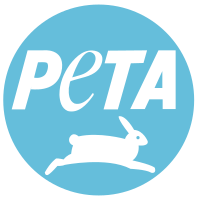People for the Ethical Treatment of Animals
American animal rights organization
People for the Ethical Treatment of Animals (PETA; stylized PeTA) is an American animal rights organization, founded on 22 March 1980 by Ingrid Newkirk and Alex Pacheco.

| This organization article is a stub. You can help out with Wikiquote by expanding it! |
Quotes
edit- Animals are not ours to eat, wear, experiment on, use for entertainment, or abuse in any other way.
- PETA's motto. Quoted in “PETA's Vital Work,” in PETA.org (2017).
- I'm writing to you from the People for the Ethical Treatment of Animals (PETA) India on behalf of our more than two million members and supporters to request that you delete Section 28 of The Prevention of Cruelty to Animals Act, 1960, which allows any animal to be killed in any manner for religion... We hope you will agree that Section 28 is an aberration in the land of 'ahimsa', 'karuna', and, increasingly, modern technology and where Article 51A(g) of the Constitution of India requires compassion for all living creatures.
- PETA, letter by PETA addressed to PM Modi, reported in Ahead of Eid, PETA appeals PM Modi to scrap law allowing animal sacrifice 2021 [1]
- This is heartbreaking Animals don’t need to die for you to celebrate Eid al-Fitr. Have a #vegan holiday.
- Tweet by PETA, 2019, [2] Muslim Twitter Hit Back at PETA’s “Irresponsible” Eid Tweet
- PETA organises peaceful animal protection awareness programmes for Christmas, Easter, Diwali, Janmashtami and other holidays, as well as Eid…it is shameful that in working to stop violence, our volunteers were made to suffer violence.
Quotes about PETA
edit- PETA has a proven track record of success. Each victory PETA wins for the animals is a stepping stone upon which we build a more compassionate world for all beings — and we will never give up our fight until all animals are treated with respect and kindness.
- When an organization has been as effective as People for the Ethical Treatment of Animals, it's hard to believe they've been around for only 35 years. It all started when some forward-thinking people launched a group that would rip the lid off corporate and government wrongdoing to animals, get behind the scenes in everything from fur ranching to chicken farming and demand that we replace cruel choices with kind ones. Where would we be today without PETA? Before PETA was around, you could pretty much do anything you wanted to animals, anytime, anyhow. And now you can't — think about that.
- When we first started, we were able to take our undercover video to 60 Minutes or 20/20, and they would fight over it and do these thought-provoking exposés. Now that society has become less interested in these programs and more interested in sensationalism and the tabloids, we have to reinvent ourselves to keep our issues on the front burner; we have had to do a lot of theatrical things. … Much of what we do is geared toward kids, who have a great sense of justice. This is the first generation in which kids have grown up with this issue. Twenty-five years ago, parents were petrified when their kids went vegetarian — some still are.